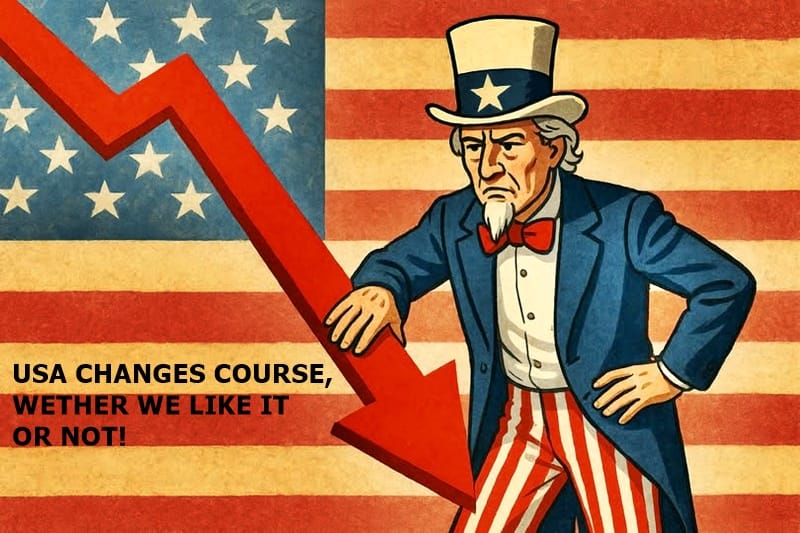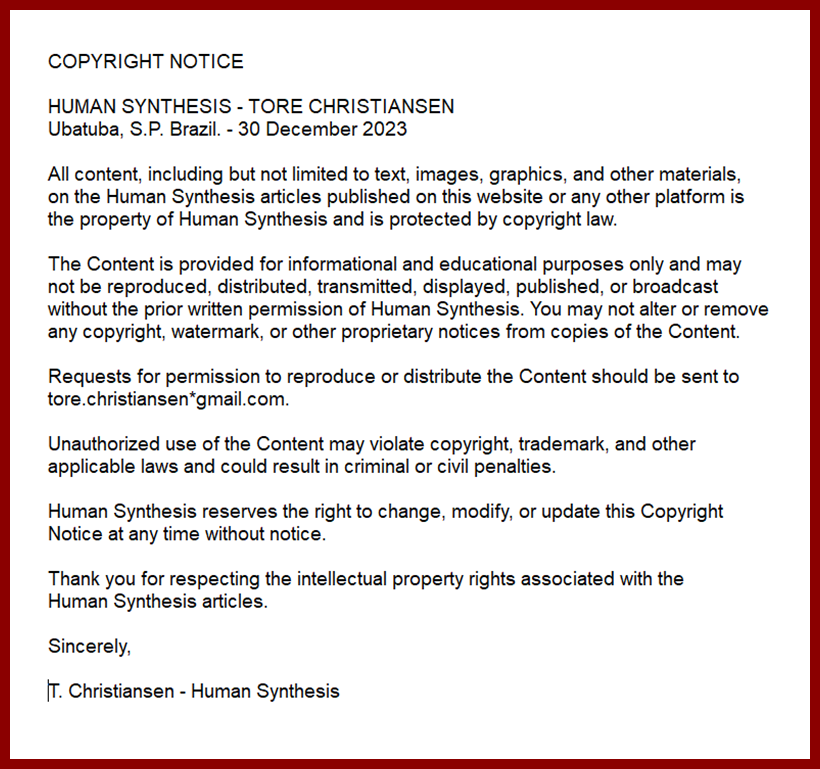USA CHANGES COURSE, WETHER WE LIKE IT OR NOT!

By Human Synthesis- 02 April 2025
The developments leading to the changes we are now seeing in the USA have been predicted by many since Trump's first presidential term.The Economic Realities Behind US Policy ShiftsDonald Trump's many statements create confusion and frustration. To understand what is happening, we must acknowledge the economic realities the USA faces:
The USA has an excessive budget deficit and must reduce expenses.China has no intention of fulfilling the promises it made upon joining the World Trade Organization (WTO).The burden of providing the world’s reserve currency has grown as other nations have expanded.China and its allies are challenging US power across numerous areas.US allies have not met their obligations to spend 2% of GDP on defense.The USA has long accepted that other countries impose higher tariffs than it does—but that is changing.
If the USA does not take action to control its economic challenges, its security guarantees will erode. The USA must change course, whether we like it or not.The USA Is Being Exploited by ChinaFirst: The budget deficit is 7% of GDP, and national debt stands at 123% of GDP. Projections indicate that debt will continue to rise. This is unsustainable. By comparison, the requirement for joining the Eurozone was a maximum deficit of 3% and debt of no more than 60% of GDP.The USA urgently needs to get its public finances under control.
Therefore, Elon Musk and the efficiency unit Doge have aimed to cut waste, eliminate erroneous payments, and streamline operations.Second: Since China joined the WTO in 2001, the US Congress has annually reviewed the trade relationship. China promised to abide by WTO rules but has shown no intention of doing so. The 2024 Congressional review warned that China is pursuing a “predatory” strategy. This means China employs all available tools—subsidies, currency manipulation, state-backed capital, guarantees, and industrial espionage—to outcompete other countries' businesses. China now dominates an increasing number of industries.
There is bipartisan agreement that China has exploited the USA, leading to increased tariffs on Chinese imports.Violating WTO RulesThird: The USA faces continuous and escalating hybrid attacks from China, Russia, Iran, and their allies—threats that also affect Norway. These include fraud, the use of criminal gangs, terrorism, hostile corporate takeovers, and infiltration of Western companies, as well as technology acquisitions.
If an open conflict were to arise between the West and China with its allies, we would be at a severe disadvantage—especially in terms of production capacity for essential resources such as minerals, metals, industrial goods, shipbuilding, and weapons.The USA barely builds ships anymore. Excluding cruise ships, it has a much smaller merchant fleet than China. Militarily, China has 400 warships, compared to fewer than 300 for the USA. In Norway, nearly half of all new major ships are set to be built in China.
While China subsidizes and supports its shipyards, Norwegian shipbuilders face rising costs, particularly due to increased ownership taxes.Weakening CompetitivenessFourth: Being the provider of a reserve currency comes with benefits, but also significant costs. As the global economy grows, more reserve currency is needed, leading central banks to buy more US dollars (USD), which increases its value.During turbulent times, capital flows to the USA as a safe haven, strengthening the USD—as seen during the COVID-19 pandemic when Norway’s financial market froze until the US Federal Reserve provided necessary liquidity.
During economic crises, the USD remains dominant. However, a stronger USD weakens American businesses' competitiveness. Meanwhile, China has kept its exchange rate relatively stable, preventing the natural balancing of global trade that was originally intended.John M. Keynes, the British representative at the Bretton Woods conference, warned about this flaw before the system was adopted. Of global currency reserves, the USD makes up 58%, while the euro accounts for 20%.A Drastic Course Correction Is Needed.
NATO members are committed to spending at least 2% of GDP on defense and, under NATO’s Article 3, maintaining a strong total defense capability to withstand and assist in the event of an attack. European countries have been slow to meet this goal, and production capacity remains too low.
Since World War II, the USA has maintained low tariffs to support allies’ post-war recovery—first for Europe and Japan, then for China upon its WTO entry. But the USA can no longer afford this. Trade policy is being revised, and import tariffs will rise.The reality is that the USA must drastically change course to break free from a downward spiral where an increasing share of tax revenue goes toward paying interest on national debt. Currently, the USA spends more on interest payments than on defense. Historically, great powers that have reached this point have not remained great powers.
The Erosion of US Security GuaranteesOne analyst examining how the USA can regain control of its debt and respond to the threat from China is Stephen Miran, head of the Council of Economic Advisers.Last year, he authored A User's Guide to Restructuring the Global Trading System, explaining why the USA’s current economic policies are unsustainable and suggesting potential solutions. Another key figure is US Treasury Secretary Scott Bessent, an experienced financial expert who has stated that his primary goal is to control national debt.
To achieve this, spending must be cut, interest rates must be lowered, and the US economy must become more competitive. The new administration sees tariffs, exchange rate policy, and security policy as three interconnected pillars of global power.Threats of tariffs are now being used to enforce WTO agreements, ensuring fair tariff levels and preventing countries from using state-backed interventions to boost exports. Additionally, allies will be required to bear the costs of their own security.
The developments that led to these changes have been foreseeable since Trump's first term and the rising ambitions of China and Russia. These nations and their allies pose as much of a threat to Norway as to the USA, given Norway's strategic Arctic location. The reality is that if the USA does not reduce its expenditures, the security guarantee we currently take for granted will erode.
The time has come for us to take responsibility for our own future.
By Elisabeth Holvik, Chief Economist, SpareBank 1 Gruppen.- Norway.
